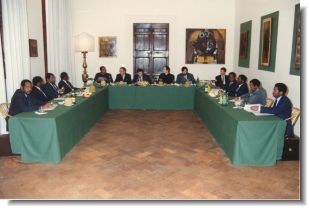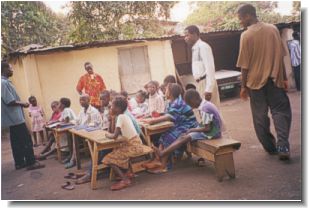|

|
COLLECTION
FOR THE VICTIMS
OF THE FLOOD IN MOZAMBIQUE
The
Community and Mozambique
In
1977 the Community's interest for Mozambique began. In 1984 the
Archbishop of Beira appealed for urgent help for Mozambique, stricken by
a drought and the consequences of war. The answer of the Community was
to send a first aeroplane with humanitarian aid, which was soon followed
by others. In 1986 a "ship of solidarity" set out with food,
medicines and equipment for development projects. Again in1988 a ship
carried 7000 tons of food. The distribution of the aid has always been
co-ordinated and controlled by volunteers of the Community together with
missionaries and the Caritas of Mozambique.
 But
it became more and more clear that the cause, the "mother" of
poverty in Mozambique was the war between the government and the
guerrilla forces that began at the time of the country's independence.
So the Community began to study the problem of peace. In July 1990, in
the seat of the Community in Rome, the monastery of Sant'Egidio, the
peace negotiations began and lasted 27 months. The negotiations took
place with the mediation of the Community, of the Archbishop of Beira
and of the Italian government. But
it became more and more clear that the cause, the "mother" of
poverty in Mozambique was the war between the government and the
guerrilla forces that began at the time of the country's independence.
So the Community began to study the problem of peace. In July 1990, in
the seat of the Community in Rome, the monastery of Sant'Egidio, the
peace negotiations began and lasted 27 months. The negotiations took
place with the mediation of the Community, of the Archbishop of Beira
and of the Italian government.
On October 4th, 1992 the Peace Agreement was signed in Rome (1),
putting an end to sixteen years of war and a million dead. This
agreement has not been violated since. The Community of Sant'Egidio has
continued its presence in Mozambique with projects to support the
democracy and development of the country.
 Already
during the conflict, but especially after the peace was signed, many
Mozambican communities of Sant'Egidio were born. Today they are in 38
different places in the country. This network of local communities,
whose members are all Mozambican, all volunteers showing their
solidarity in various initiatives, represents a fruit of peace and a
resource for the country. On the occasion of the recent flood, the
members of the local communities of Sant'Egidio have represented a
precious reference point to the first providers of aid, especially in
the poor areas where the communities were already present with their
solidarity and initiatives. Already
during the conflict, but especially after the peace was signed, many
Mozambican communities of Sant'Egidio were born. Today they are in 38
different places in the country. This network of local communities,
whose members are all Mozambican, all volunteers showing their
solidarity in various initiatives, represents a fruit of peace and a
resource for the country. On the occasion of the recent flood, the
members of the local communities of Sant'Egidio have represented a
precious reference point to the first providers of aid, especially in
the poor areas where the communities were already present with their
solidarity and initiatives.
|
